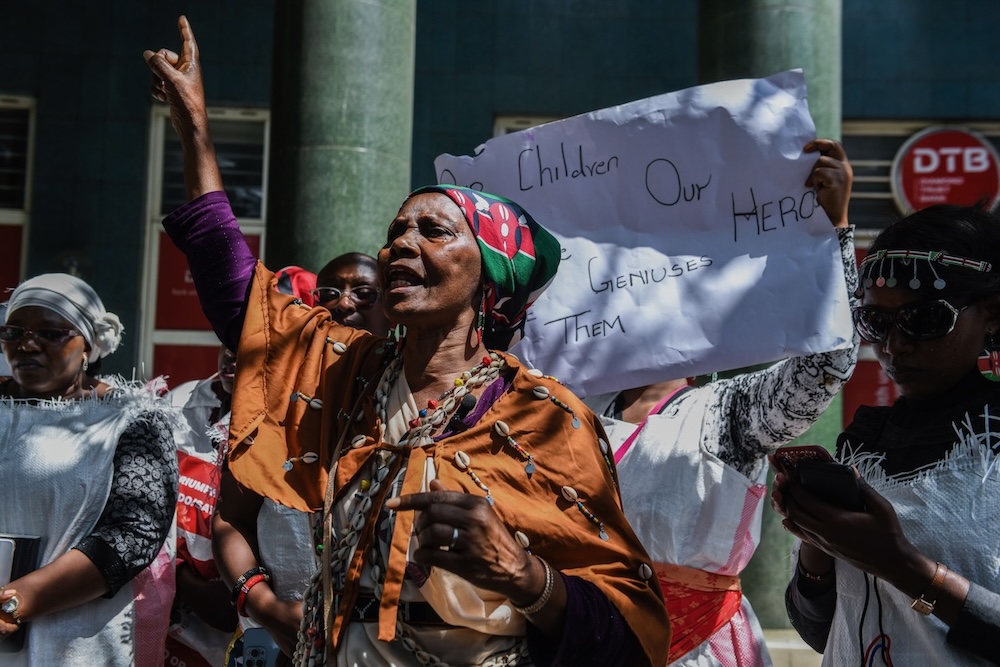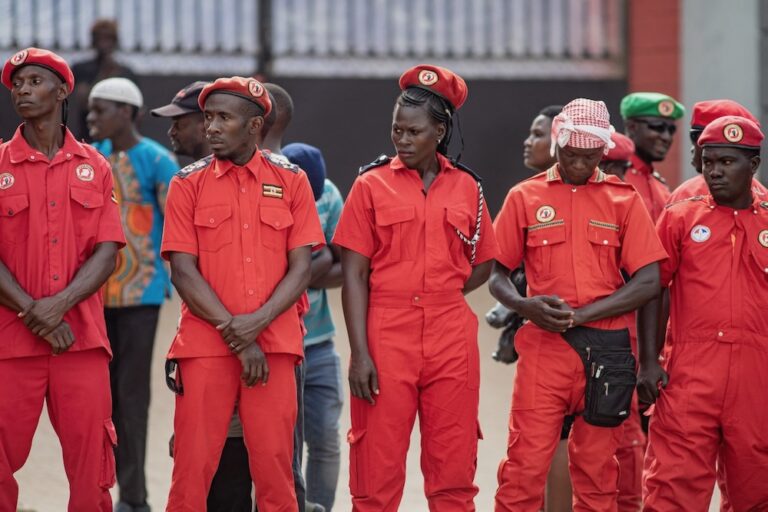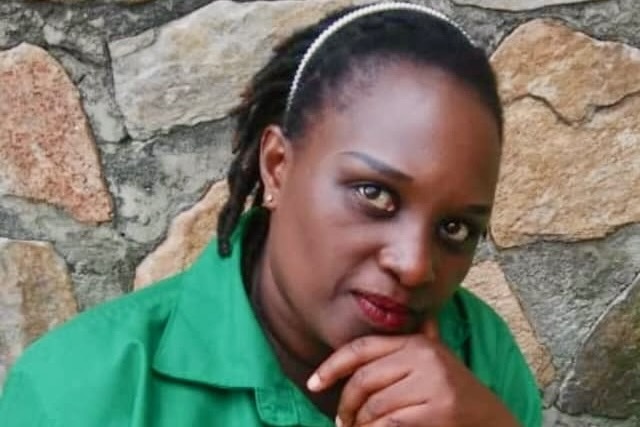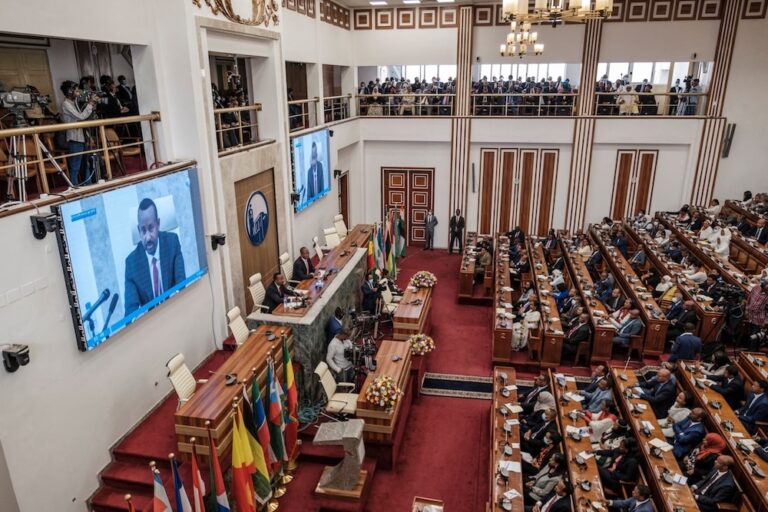January 2025 in Africa: A free expression and civic space round-up produced by IFEX's Regional Editor Reyhana Masters, based on IFEX member reports and news from the region.
Deteriorating conditions in DRC
The capture of Goma towards the end of January by the March 23 Movement (M23) rebels reverberated throughout the region, heightening fears of an escalating regional conflict.
The situation has further fragmented the already fragile state of media freedom and freedom of expression in the Democratic Republic of Congo. Local and international radio stations have stopped broadcasting and according to Reporters Without Borders (RSF), people in the area are obliged to tune into “Rwandan radio stations broadcasting from the neighbouring town of Gisenyi for information.”
The pressure on the media sector has been relentless, and for decades they have been reeling under the weight of continuing to report, in what is often described as a volatile hot spot where the risks are high and the landscape is taxing. According to the Committee to Protect Journalists (CPJ): “the assault on Goma has brought familiar dangers for Congolese journalists, who for years have navigated intimidation and attacks from government and armed groups in the country’s restive, mineral-rich east.”
Journalists contend with erratic power supplies, disrupted access to the internet and severe censorship by both government and the rebel forces seeking to control the narrative. Along with this, they are forced to navigate intimidation, threats, assaults, and death threats.
“Any solution to this dire crisis must factor in the protection of and respect for the right to information. RSF calls on all parties involved in the conflict to ensure that the media can do their work freely — and to protect journalists.”
Sadibou Marong, director of the RSF Sub-Saharan Africa bureau
Uganda: A major step forward in the protection of the right to a fair trial
On 31 January, Uganda’s Supreme Court delivered a bombshell decision, declaring the trial of civilians in military courts unconstitutional, and ordered an immediate halt to all ongoing prosecutions. The ruling further commanded all ongoing trials involving civilians to be transferred to ordinary courts of law. According to Human Rights Watch “it stopped short of declaring past convictions under the military courts void.”
The Supreme Court ruling is aligned to a 2021 Constitutional Court ruling that had declared that the General Court Martial had no power to try civilians. The UN Office of the High Commissioner for Human Rights welcomed the decision, and urged authorities to ensure that the “Uganda People’s Defense Forces Act (UPDF), under which civilians have been tried before court martials, should be further amended to align with relevant provisions of the Ugandan constitution and international human rights law, in order to ensure compliance with international standards of due process and fair trial.”
For years, President Yoweri Museveni and his government have used the military courts as a tool to prosecute political opponents and government critics, often violating their rights to fair trials and freedoms guaranteed by Uganda’s constitution.
One such case is that of Ugandan opposition politician and former presidential candidate for the Forum for Democratic Change (FDC) political party, Kizza Besigye. On 16 November 2024, Besigye was abducted in Nairobi, Kenya and four days later appeared at Makindye General Court Martial in Kampala, Uganda, under a heavily armed military escort. Alongside FDC member Haji Obeid Lutale, he was charged with security related offenses and unlawful possession of firearms and ammunition.
Adding to this injustice, on 7 January 2025, a military court sentenced Besigye’s lawyer, Eron Kiiza, “to nine months in prison without a trial or legal representation for contempt of court following an altercation in the court.” The human rights lawyer’s conviction was in retaliation for his protest of a high-ranking Ugandan military official’s decision to deny him access to Besigye during court proceedings.
Kenya’s wave of abductions
The escalating crisis of abductions in Kenya reached a critical point on 30 January with the grim discovery of the bodies of two missing young men – Justus Mtumwa and Martin Mwau – in a Nairobi morgue. This occurred just hours before Inspector General of Police Douglas Kanja and Director of Criminal Investigations Mohamed Amin were mandated by the court to explain the whereabouts of the missing men and their colleague and friend Karani Muema.
The enforced disappearances and extrajudicial killings of perceived leaders of the nationwide protests trace back to June 2024. Many individuals who were reported missing after the country’s anti-tax protests later resurfaced, but tragically, some were found dead. To date, Kenya’s National Commission on Human Rights (KNCHR) has recorded 82 abductions, and 29 people are still missing. Human rights defenders, activists, and outspoken government critics appear to have been specifically targeted.
The public outcry against these violations intensified just before the Christmas holidays, after five young Kenyan men – Peter Muteti, Billy Mwangi, Bernard Kavuli, Ronny Kiplangat and popular cartoonist Kibet Bull – went missing. Although they were released several weeks later, the families remain distraught as the men recounted their experiences of trauma and torture.
Kenya’s Public Service Cabinet Secretary Justin Muturi added his voice to the long-standing appeals by the KNCHR, the Law Society of Kenya, the Police Reforms Working Group and other rights groups, calling for transparency and accountability in addressing the wave of kidnappings and extrajudicial killings.
Muturi has publicly criticised the government’s handling of this sensitive issue by drawing on his personal experience. In August 2024, Muturi pleaded directly with President William Ruto for the immediate release of his son, who had been abducted. His condemnation of the government’s handling of the situation and his demand for the establishment of a public commission of inquiry are significant developments in the ongoing efforts to address human rights abuses in Kenya.
These kidnappings are reminiscent of a darker past. Security analyst and former national security agent George Musamali told DW News that “the mystery surrounding the current situation mirrors past practices, in which security officials would be “handpicked” and given instructions directly from the government, bypassing the police command structures.”
Through Commissioner Solomon Ayele Dersso, the Country Rapporteur on Human Rights in the Republic of Kenya, the African Commission on Human and Peoples’ Rights has urged the government to:
- Conduct thorough, independent, and transparent investigations into allegations of abductions, excessive use of force, and extrajudicial killings, and hold perpetrators accountable, regardless of rank or status.
- Provide immediate support to families of abducted and disappeared persons, ensuring cooperation in investigations, legal assistance, and access to justice and remedies.
- Inform families and the public about arrests and detentions, and ensure prompt production of detainees before a court of law.
In brief
- South Sudan’s National Communication Authority (NCA) ordered the shutdown of social media platforms for 90 days from 22 January. The suspension was instituted after footage of alleged attacks on South Sudanese nationals in Sudan went viral – leading to protests and retaliatory violence. Five days later the temporary suspension was lifted, soon after the NCA confirmed the removal of inflammatory content. For many South Sudanese small business owners, digital marketers, and content creators, social media is more than just a communication tool – it is a crucial business resource.
- Nigeria’s Centre for Media and Society (CEMESO) launched their documentary, Stories from The Shutdown, outlining the experiences of individuals and communities impacted by government-mandated internet disruptions in the country between 2021 and 2022. This documentary features personal accounts from people affected by the disruption, as well as expert insights from key stakeholders, highlighting the profound implications of these actions on Nigeria’s socio-political landscape.
- Through the month of January a few countries in West Africa suspended media outlets. Benin’s media regulator, the High Authority for Audiovisual and Communication (HAAC) suspended two newspapers – L’Audace Infos and Le Patriote and online media outlets Crystal News, Les Pharaons and the Tik Tok account of Madame Actu. Romuald Alingo, the managing editor of Le Patriote, also had his press card withdrawn. Privately owned news site Dépêche Guinée was suspended indefinitely by Guinea’s High Authority of Communication on 27 January, and in Niger, private channel Canal 3 TV was suspended by the country’s communication minister on 17 January after the broadcasting of the show “Baromètre des membres du gouvernement 2024.”



